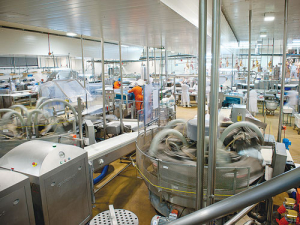World Butchers' Challenge captains go head-to-head before competition
Ahead of the World Butchers' Challenge, the captains of 14 nations’ teams squared off in Paris over the weekend.
 The NZ Meatworkers Union claims the answer to the labour shortage in the industry is more than just bringing in migrant workers.
The NZ Meatworkers Union claims the answer to the labour shortage in the industry is more than just bringing in migrant workers.
The meat industry is short of about 2000 workers, a gap needing filling by much more than just signing up foreign workers.
Ask any long-term meat worker; things aren’t how they used to be.
Sure, the meat industry has always been a seasonal industry. This means that no meat worker gets year-round work and there’s always a gap in their earnings.
Meat workers used to call this their ‘holidays’ because the gap was enough to be filled by their accrued holiday pay.
But that gap has grown bigger. Wages have been steadily declining for most meat workers over the last couple of decades while productivity has increased.
The ‘living wage’ of $20.50/hour doesn’t exist for many process workers and labourers. You have to consider their precarious employment and months dependent on finding other work, or the state filling the gap with social welfare benefits.
As for holidays, who gets a paid holiday in the meat industry?
When the meat industry was deregulated in 1981, politicians and commentators encouraged closing meat plants where meat workers were readily available. It has become obvious that in the small rural towns where the meat industry predominates there would eventually be a shortage of labour. Young people are more mobile and seek better opportunities elsewhere. The skilled workforce is ageing, and the freezing works are no longer an attractive option.
Imagine this: you work in a shitty job (I mean animal faeces) with blood and heat, you’re on your feet on concrete floors for hours a day, wearing increasingly invasive protective gear. You rush to have a break, and get yelled at or punished if you are late back to the chain, the speed of which is regulated by the employer or, if you are lucky, by a union agreement.
Your pay depends on throughput, in other words how many beasts are killed on your shift: that’s called piece work.
We’ve been here before. In 2005 the Meat Industry Association said it needed 1000 migrants and were looking to have the meat industry join the Regional Seasonal Employment Scheme. The then Labour Government declined this request and set up a three-party working group including the Meat Workers’Union, Department of Labour (MBIE) and the Meat Industry Association.
A lot of work was done to identify what would make the industry more attractive to working people and how to avoid costly competition. That report was shelved as soon as the National Government was elected in 2008.
Instead some employers in the meat industry have resorted to downward pressure on wages. They’re relying on the old methods of resisting unionisation, challenging workers who choose to join a union, using aggressive actions such as unlawful lockouts, refusing access by union officials and targeting union activists in layoffs and return to work.
I’m not saying the whole industry is like this; it’s not. We have good relationships with most of the industry, but it is time for them to step up. It’s not good enough for their industry association to be moaning about the shortage of workers, when they have largely stood by and allowed one of the top five meat companies to impoverish and de-unionise workers.
There is another solution: we reconvene the industry three-party group. We work together to find short- and longer-term solutions not only to labour shortages, but also to the challenge of making this industry attractive once again to working people. We figure out how seasonal work can be real work; and there are options.
The challenge for the meat industry is that the companies be prepared to listen.
Managing director of Woolover Ltd, David Brown, has put a lot of effort into verifying what seems intuitive, that keeping newborn stock's core temperature stable pays dividends by helping them realise their full genetic potential.
Within the next 10 years, New Zealand agriculture will need to manage its largest-ever intergenerational transfer of wealth, conservatively valued at $150 billion in farming assets.
Boutique Waikato cheese producer Meyer Cheese is investing in a new $3.5 million facility, designed to boost capacity and enhance the company's sustainability credentials.
OPINION: The Government's decision to rule out changes to Fringe Benefit Tax (FBT) that would cost every farmer thousands of dollars annually, is sensible.
Compensation assistance for farmers impacted by Mycoplama bovis is being wound up.
Selecting the reverse gear quicker than a lovestruck boyfriend who has met the in-laws for the first time, the Coalition Government has confirmed that the proposal to amend Fringe Benefit Tax (FBT) charged against farm utes has been canned.